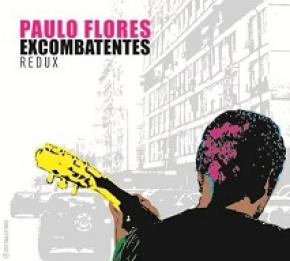La VOIX de Paulo Flores, douce et chaleureuse, vibrante et grave, nous conte des histoires de l’Angola en ce début du XXIème siècle. C’est la voix de l’âme, du blues et de la fête qui s’adresse à chacun de nous pour nous entraîner dans un concert d’harmonies et d’humanité.
Paulo Flores est depuis vingt cinq ans un artiste majeur, immensément populaire en Angola et très aimé par lespublics de langue portugaise. Il présente pour la première fois en France le disque et le concert EXCOMBATENTES. C’est également la première fois que le Théâtre de la Ville reçoit un artiste d’Angola.
 EXCOMBATENTES Redux, l’album qui sort en France, ce sont 15 titres extraits du coffret trois albums sorti en 2009, EXCOMBATENTES que Paulo a réalisé entre Luanda, Rio de Janeiro et Lisbonne, avec des musiciens de l’Angola, du Brésil, du Portugal et de pays africains de langue portugaise. Cette treizième création discographique est une oeuvre de la maturité.
EXCOMBATENTES Redux, l’album qui sort en France, ce sont 15 titres extraits du coffret trois albums sorti en 2009, EXCOMBATENTES que Paulo a réalisé entre Luanda, Rio de Janeiro et Lisbonne, avec des musiciens de l’Angola, du Brésil, du Portugal et de pays africains de langue portugaise. Cette treizième création discographique est une oeuvre de la maturité.
Paulo Flores est né il y a 40 ans à Luanda, capitale de l’Angola. Les “Ex-Combattants”, dont il raconte la vie sur nombre de ses titres, ce sont les millions d’Angolais qui ont survécu durant plus de 40 ans dans un pays en état de guerre : les combats contre le colonialisme portugais furent suivis, après l’indépendance en 1975, par les affrontements entre les deux grands partis, soutenus par des puissances étrangères attirées par les richesses dupays. La paix ne fut scellée qu’en 2002. La musique est un creuset de résistance, une expression de vie et d’espoir.
Avec les grands artisans de la tradition luandaise, Paulo Flores a exploré la pulsation magique sur laquelle les guitares chantent en tons mineurs : la virtuosité du doigté sur les cordes, le cadencement de la guitare basse, lebattement sourd des batuques. Il a su créer “son” semba, mêlant les sons d’hier et d’aujourd’hui. Il a ainsi contribuéà entraîner la jeune génération à la redécouverte du riche patrimoine angolais. À partir de cellules rythmiques et mélodiques de tout le pays, Paulo Flores compose à la guitare des formes modernes, qu’il pare d’orchestrationssingulières. Son inspiration s’enrichit au gré de ses voyages et de ses rencontres.
Les accents brésiliens de certains titres trouvent leur origine dans la longue histoire, tragique et féconde, qui unitles peuples de l’Angola au géant sud-américain. Paulo transforme cet héritage en dialogue atlantique. Plusieurs musiciens brésiliens ont participé à EXCOMBATENTES ; notamment le violoncelliste Jaques Morelenbaum, avec lequel Paulo travaille régulièrement depuis dix ans, et le percussionniste Marcos Suzano.
Les chants et les danses du Cap Vert et des autres pays africains autrefois colonisés, comme l’Angola, par le Portugal, font partie de la vie de Paulo. Il chante en duo, sur scène et sur disque, avec Mayra Andrade. Despulsations, des sons, des couleurs, venues de toutes les Afriques, se font entendre sur certains titres. L’Afrique quele “premier monde” n’entend pas. Paulo nous communique son énergie de la survie et de la création au quotidien. Sur le ton de la complainte, en mélodie chaloupée, ou sur un rythme très dansant, les mots de Paulo Flores saisissent des images furtives de fête et d’amitié, de tragiques flashs de misère et de violence, des séquences tendres et intimes. Il lance des cris d’alerte et de révolte contre l’injustice et la brutalité d’un système prédateur qui contrôle les richesses et cloisonne la société. Il exprime sa perplexité devant la nouvelle Angola, riche et inégalitaire. Sa créativité musicale et sa générosité artistique ont conquis les coeurs de plusieurs générations qui se pressent par dizaines de milliers dans ses concerts.

Sur scène, au Théâtre de la Ville, Paulo Flores sera entouré de trois générations de talentueux musiciens de styles différents. Un puissant trio de guitares: Tedy Nsingi, vétéran de la soul angolaise, Pirica Duya, digne héritier desgrands solistes luandais, Manecas Costa, intrépide virtuose venu de la Guinée-Bissau. Le parcours du jeune clavier Armando Gobliss relie l’Angola et le Congo. Le batteur João Ferreira, le bassiste Mias Galheta, le percussionniste Dalú ont beaucoup contribué, par leurs singularités et leurs versatilités, à la revitalisation de lascène musicale en Angola. À la voix de Paulo s’associeront les choeurs de Zizi Vasconcelos et Rita Damazio. Pourle concert au Festival Rio Loco à Toulouse, trois cuivres et le chateur Yuri da Cunha viendront compléter la formation.
Auteur-compositeur prolifique et talentueux, Paulo Flores embrasse la profusion musicale de son pays pour la projeter au diapason des vibrations du monde. Sa singularité créative est constamment renouvelée par les échos dela vie et les connexions avec divers lieux de notre planète. L’intimité individuelle est traversée par les cris du monde.
Paulo Flores vient à la rencontre du public français, pour des instants magiques d’harmonie et d’allégresse. Il offre ses mélodies, sa poésie, sa personne pour nous faire partager ses émotions d’Angolais, en ce début du XXIème siècle.